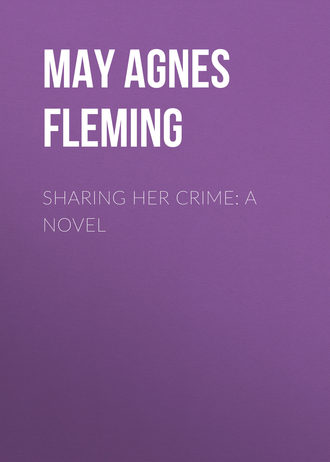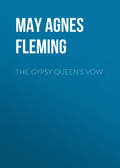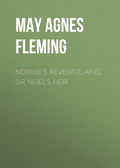
May Agnes Fleming
Sharing Her Crime: A Novel
CHAPTER XXXII.
"THE QUEEN OF SONG."
"Give me the boon of love —
Renown is but a breath,
Whose loudest echo ever floats
From out the halls of death.
A loving eye beguiles me more
Than Fame's emblazon'd seal;
And one sweet note of tenderness,
Than triumph's wildest peal." – Tuckerman.
"Oranmore, my dear fellow, welcome back to Italy!" exclaimed a distinguished-looking man, as Louis – the day after his arrival in Venice – was passing through one of the picturesque streets of that "palace-crowned city."
"Ah, Lugari! happy to see you!" said Louis, extending his hand, which was cordially grasped.
"When did you arrive?" asked the Italian, as, linking his arm through that of Louis, they strolled toward the "Bridge of the Rialto."
"Only yesterday. My longings for Venice were too strong to be resisted; so I returned."
"Then you have not heard our 'Queen of Song' yet?" inquired his companion.
"No. Who is she?"
"An angel! a seraph! the loveliest woman you ever beheld! – sings like a nightingale, and has everybody raving about her!"
"Indeed! And what is the name of this paragon?"
"She is called Madame Evelini – a widow, I believe – English or American by birth. She came here as poor as Job and as proud as Lucifer. Now, she has made a fortune on the stage; but is as proud as ever. Half the men at Venice are sighing at her feet; but no icicle ever was colder than she – it is impossible to warm her into love. There was an English duke here not long ago, who – with reverence be it spoken! – had more money than brains, and actually went so far as to propose marriage; and, to the amazement of himself and everybody else, was most decidedly and emphatically rejected."
"A wonderful woman, indeed, to reject a ducal crown. When does she sing?"
"To-night. You must come with me and hear her."
"With pleasure. Look, Lugari – what a magnificent woman that is!"
"By St. Peter! it's the very woman we are speaking of – Madame Evelini herself!" exclaimed Lugari. "Come, we'll join her. I have the pleasure of her acquaintance. Take a good look at her first, and tell me if she does not justify my praises."
Louis, with some curiosity, scrutinized the lady they were approaching. She was about the middle height, with an exquisitely-proportioned figure – a small, fair, but somewhat melancholy face, shaded by a profusion of pale-brown ringlets. Her complexion was exquisitely fair, with dark-blue eyes and beautifully chiseled features. As he gazed, a strange, vague feeling, that he had seen that face somewhere before, flashed across his mind.
"Well, what do you think of her?" said Lugari, rousing him from a reverie into which he was falling.
"That she is a very lovely woman – there can be but one opinion about that."
"How old would you take her to be?"
"About twenty, or twenty-three at the most."
"Phew! she's over thirty."
"Oh, impossible!"
"Fact, sir; I had it from her own lips. Now, I'll present you; but take care of your heart, my boy – few men can resist the fascinations of the Queen of Song."
"I have a counter-charm," said Louis, with a cold smile.
"The memory of some fairer face in America, I suppose. Well, we shall see. Good-morning, Madame Evelini," he said, acknowledging that lady's salutation. "Charming day. Allow me to present to you my friend Mr. Oranmore."
From the first moment the lady's eyes had fallen on the face of Louis, she had gazed as if fascinated. Every trace of color slowly faded from her face, leaving her cold and pale as marble. As his name was uttered she reeled, as if she were faint, and grasped the arm of Lugari for support.
"Whom did you say?" she asked, in a breathless voice.
"Mr. Oranmore, a young American," replied Lugari, looking in amazement from the lady to Louis – who, quite as much amazed as himself, stood gazing upon her, lost in wonder.
"Oranmore!" she exclaimed, unheeding their looks – "Oranmore! Surely not Barry Oranmore?"
"That was my father's name," replied the astonished Louis.
A low cry broke from the white lips of the lady, as her hands flew up and covered her face. Lugari and Louis gazed in each other's faces in consternation. She dropped her hands at last, and said, in a low, hurried voice:
"Excuse this agitation, Mr. Oranmore. Can I have the pleasure of a private interview with you?"
"Assuredly, madam," said the astonished Louis.
"Well, call at my residence in the Palazzo B – , this afternoon. And now I must ask you to excuse me, gentlemen. Good-morning."
She hurried away, leaving the two young men overwhelmed with amazement.
"What the deuce does this mean?" said Lugari.
"That's more than I can tell. I'm as much in the dark as you are."
"She cannot have fallen in love with him already," said Lugari, in the musing tone of one speaking to himself.
Louis laughed.
"Hardly, I think. I cannot expect to succeed where a royal duke failed."
"There's no accounting for a woman's whims; and he's confoundedly good-looking," went on Lugari, in the same meditative tone.
"Come, Antonio, none of your nonsense," said Louis. "Come with me to my studio, and spend the morning with me. It will help to pass the time until the hour for calling on her ladyship."
They soon reached the residence of the artist. The door was opened for them by a boy of such singular beauty, that Lugari stared at him in surprise and admiration. His short, crisp, black curls fell over a brow of snowy whiteness, and his pale face looked paler in contrast with his large, melancholy, black eyes.
"Well, Isadore," said Louis kindly, "has there been any one here since?"
"No, signor," replied the boy, dropping his eyes, while a faint color rose to his cheek, as he met the penetrating gaze of the stranger.
"That will do, then. Bring wine and cigars, and leave us."
The boy did as directed, and hurried from the room.
"Handsome lad, that," said Lugari, carelessly. "Who is he?"
"Isadore something – I forget what. He is, as you say, remarkably handsome."
"He is not a Venetian?"
"No; English, I believe. I met him in Naples, friendless and nearly destitute, and took charge of him. Have a glass of wine?"
Lugari looked keenly in the face of his friend with a peculiar smile, that seemed to say: "Yes – I understand it perfectly;" but Louis, busy in lighting a cigar, did not observe him.
The morning passed rapidly away in gay conversation; and at the hour appointed, Louis sat in one of the magnificent rooms of the Palazzo B – , awaiting the entrance of the singer.
She soon made her appearance, quite bewitching in blue silk, but looking paler, he thought, than when he had seen her in the morning.
"I see you are punctual," she said, holding out her hand, with a slight smile. "Doubtless you are at your wits' end trying to account for my singular conduct."
"My only wonder is, madam, how I could have merited so great an honor."
"Ah! I knew you would say something like that," said the lady. "Insincere, like the rest of your sex. Well, you shall not be kept long in suspense. I have sent for you here to tell you my history."
"Madam!" exclaimed Louis, in surprise.
"Yes, even so. It concerns you more nearly, perhaps, than you think. Listen, now."
She leaned her head in her hand, and, for a moment, seemed lost in thought; while Louis, with eager curiosity, waited for her to begin.
"I am Irish by birth," she said, at last, looking up; "I was born in Galway. My father was a poor farmer, and I was his only child. I grew up a wild, untutored country girl; and reached the age of fifteen, knowing sorrow and trouble only by name.
"My occupation, sometimes, was watching my father's sheep on the mountain. One day, as I sat merrily singing to myself, a horseman, attracted by my voice, rode up and accosted me. I was bold and fearless, and entered into conversation with him as if I had known him all my life – told him my name and residence; and learned, in return, that he was a young American of respectable and wealthy connections, who had visited Galway to see a friend.
"From that day forth, he was constantly with me; and I soon learned to watch for his coming as I had never watched for any one before. He was rash, daring, and passionate; and, captivated by my beauty (for I was handsome then), he urged me to marry him privately, and fly with him. I had never learned to control myself in anything; and loving him with a passion that has never yet died out, I consented. I fled with him to England. There we were secretly wedded. He took me to France, where we remained almost a year – a year of bliss to me. Then he received letters demanding his immediate presence in America. He would have left me behind him, and returned for me again; but I refused to leave him; I therefore accompanied him to his native land, and a few weeks after – one stormy Christmas Eve – my child, a daughter, was born.
"I never saw it but once. The nurse must have drugged me – for I have a dim recollection of a long, long sleep, that seemed endless; and when I awoke, I found myself in a strange room with the face of a strange woman bending over me. To my wild, bewildered inquiries, she answered, that I had been very ill, and my life despaired of for several weeks; but that I was now recovering. I asked for my husband and child. She knew nothing of them, she said. I had been brought there in a carriage, after night, by a man whose features she could not recognize – he was so muffled up. He had paid her liberally for taking charge of me, and promised to return to see me in a few weeks.
"I was a child in years and wisdom, and suspected nothing. I felt angry at his desertion, and cried like the petted child I was, at his absence. The woman was very kind to me, though I saw she looked upon me with a sort of contempt, the reason of which I did not then understand. Still, she took good care of me, and in a fortnight I was as well as ever.
"One evening, I sat in my room silent and alone (for I was not permitted to go out), and crying like a spoiled baby, when the sound of a well-known voice reached my ear from the adjoining room. With a cry of joy, I sprang to my feet, rushed from the room, and fell into the arms of my husband. In my joy at meeting him, I did not perceive, at first, the change those few weeks had made in him. He was pale and haggard, and there was an unaccountable something in his manner that puzzled me. He was not less affectionate; but he seemed wild, and restless, and ill at ease.
"My first inquiry was for my child.
"'It is dead, Eveleen,' he answered, hurriedly; 'and you were so ill that it became necessary to bring you here. Now that you are better, you must leave this and come with me.'
"'And you will publicly proclaim our marriage, and we will not be separated more?' I eagerly inquired.
"He made no answer, save to urge me to make haste. In a few moments I was ready; a carriage at the door. He handed me in, then followed, and we drove rapidly away.
"'Where are we going?' I asked, as we drove along.
"'Back to Ireland; you are always wishing to return.'
"'But you will go with me, will you not?' I asked, in vague alarm.
"'Yes, yes; to be sure,' he answered, quickly. Just then, the murmur of the sea reached my ear; the carriage stopped, and my husband assisted me out.
"A boat was in waiting on the shore. We both entered, and were rowed to the vessel lying in the harbor. I reached the deck, and was conducted below to a well-furnished cabin.
"'Now, Eveleen, you look fatigued and must retire to rest. I am going on deck to join the captain for a few hours,' said my husband, as he gently kissed my brow. His voice was low and agitated, and I could see his face was deadly pale. Still, no suspicion of the truth entered my mind. I was, indeed, tired; and wearily disengaging myself from the arms that clasped me in a parting embrace, I threw myself on my bed, and in a few minutes was fast asleep. My husband turned away and went on deck, and – I never saw him more."
Her voice failed, and her lips quivered; but after a few moments she went on.
"The next morning the captain entered the cabin and handed me a letter. I opened it in surprise. A draft for five thousand dollars fell out, but I saw it not; my eyes were fixed in unspeakable horror on the dreadful words before me.
"The letter was from my husband. He told me that we were parted forever, that he had wedded another bride, and that the vessel I was in would convey me home, where he hoped I would forget him, and look upon the past year only as a dream. I read that terrible letter from beginning to end, while every word burned into my heart and brain like fire. I did not faint nor shriek; I was of too sanguine a temperament to do either; but I sat in stupefied despair; I was stunned; I could not realize what had happened. The captain brought me a newspaper, and showed me the announcement of his marriage to some great beauty and heiress – some Miss Erliston, who – "
"What!" exclaimed Louis, springing fiercely to his feet. "In the name of heaven, of whom have you been talking all this time?"
"Of my husband – of your father – of Barry Oranmore!"
He staggered into his seat, horror-stricken and deadly white. There was a pause, then he said, hoarsely:
"Go on."
"I know not how that voyage passed – it is all like a dream to me. I reached Liverpool. The captain, who had been well paid, had me conveyed home; and still I lived and moved like one who lives not. I was in a stupor of despair, and months passed away before I recovered; when I did, all my childishness had passed away, and I was in heart and mind a woman.
"Time passed on. I had read in an American paper the announcement of my false husband's dreadful death. Years blunted the poignancy of my grief, and I began to tire of my aimless life. He had often told me my voice would make my fortune on the stage. Acting on this hint, I went to London, had it cultivated, and learned music. At last, after years of unremitting application, I made my debut. It was a triumph, and every fresh attempt crowned me with new laurels. I next visited France; then I came here; and here I have been ever since. To-day, when I beheld you, the very image of your father as I knew him first, I almost imagined the grave had given up its dead. Such is my story – every word true, as heaven hears me. Was I not right, when I said it concerned you more nearly than you imagined?"
"Good Heaven! And was my father such a villain?" said Louis, with a groan.
"Hush! Speak no ill of the dead. I forgave him long ago, and surely you can do so too."
"Heaven help us all! what a world we live in!" said Louis, while, with a pang of remorse, his thoughts reverted to Celeste; and he inwardly thought how similar her fate might have been, had she consented to go with him.
"And was your child really dead?" he inquired, after a pause, during which she sat with her eyes fixed sadly on the floor. "He may have deceived you in that as in other things."
"I know not," she answered; "yet I have always had a sort of presentiment that it still lives. Oh, if heaven would but permit me to behold her alive, I could die happy!"
Louis sat gazing upon her with a puzzled look.
"I know not how it is," he said, "but you remind me strangely of some one I have seen before. I recognize your face, vaguely and indistinctly, as one does faces they see in dreams. I am sure I have seen some one resembling you elsewhere."
"Only fancy, I fear," said the lady, smiling, and shaking her head. "Do you intend hearing me sing to-night?"
"Oh, decidedly! Do you think I would miss what one might make a pilgrimage round the world to hear once?"
"Flattery! flattery! I see you are like all the rest," said Madame Evelini, raising her finger reprovingly.
"Not so, madam; I never flatter. And now I regret that a previous engagement renders it necessary for me to leave you," said Louis, taking his hat and rising to leave.
"Well, I shall expect to see you soon again," she said, with an enchanting smile; and Louis, having bowed assent, left the house; and, giddy and bewildered by what he had just heard, turned in the direction of his own residence.
CHAPTER XXXIII.
A STARTLING DISCOVERY
"Fixed was her look and stern her air;
Back from her shoulders streamed her hair;
Her figure seemed to rise more high;
Her voice, Despair's wild energy
Had given a tone of prophecy." – Marmion.
Weeks passed away. Louis became a daily visitor at the Palazzo B – . His growing intimacy with the beautiful "Queen of Song" was looked upon with jealous eyes by her numerous admirers; and many were the rumors circulated regarding her affection for the handsome young American. But Madame Evelini was either too proud or too indifferent to heed these reports, and visited Louis in his studio whenever she pleased, leaving the world to say of her what it listed. Louis, too, was winning fame as an artist, and, next to madame herself, was becoming one of the greatest celebrities in Venice.
"What a handsome boy that attendant of yours is!" said the lady, one day, to Louis, as Isadore quitted the room; "all who visit you vie with each other in their praises of his beauty."
"Who? Isadore? Yes, he is handsome; but a most singular youth – silent, taciturn, at times almost fierce, and at others, sullenly morose."
"He seems to have a strong antipathy to ladies, and to me in particular," said Madame Evelini; "he looks as if he wished to shut the door in my face every time I come here."
"Yes, that is another of his oddities; in fact, he is quite an unaccountable lad."
"He is very much attached to you, at all events. If he were a woman, I should say he is in love with you, and jealous of the rest of us," said madame, laughing. "As it is, it can only be accounted for by ill-nature on his part. Well, adieu!" said madame, rising to take her leave.
Louis soon had a most convincing proof of the lad's attachment. Being detained one evening, by some business, in one of the narrow courts inhabited by the lower class in Venice, he returned with a violent headache. He grew worse so rapidly, that before night he was in a high fever, raving deliriously.
A physician was sent for, who pronounced it to be a dangerous and most infectious fever, and advised his immediate removal to a hospital, where he might receive better attendance than he could in his lodgings. But Isadore positively refused to have him removed, vehemently asserting that he himself was quite competent to take care of him.
And well did he redeem his word. No mother ever nursed her sick child with more tender care than he did Louis. Night and day he was ever by his side, bathing his burning brow, or holding a cooling draught to his feverish lips. And though his pale face grew paler day after day, and his lustrous black eyes lost their brightness with his weary vigils, nothing could tempt him from that sick room. With womanly care, he arranged the pillows beneath the restless head of the invalid; drew the curtains to exclude the glaring light, totally unheeding the danger of contagion. With jealous vigilance, too, he kept out all strangers. Madame Evelini, upon hearing of her friend's illness, immediately came to see him, but she was met in the outer room by Isadore, who said, coldly:
"You cannot see him, madame; the physician has forbidden it."
"But only for one moment. I will not speak to him, or disturb him," pleaded Madame Evelini.
"No; you cannot enter. It is impossible," said Isadore, as he turned and left the room, fairly shutting the door in her face.
In his wild delirium, Louis talked incessantly of Celeste, and urged her with passionate vehemence to fly with him. At such times, the dark brow of Isadore would knit, and his eyes flash with smoldering fire beneath their lids. But if his own name was mentioned, his beautiful face would light up with such a radiant look of light and joy, that he seemed recompensed for all his weary watching and unceasing care.
At length, a naturally strong constitution, and the tender nursing of Isadore triumphed over disease, and Louis became convalescent. And then he began to realize all he owed to the boy who had been his guardian-angel during his illness.
"How can I ever repay you, Isadore?" he said, one day, as the youth hovered by his side, smoothing the tossed pillows, and arranging the bed-clothes with a skill few nurses could have surpassed.
"I wish for no return, signor. I am only too happy to have been of service to you," said the boy, dropping his eyes.
"Well, at least, you will find I am not ungrateful. Once I am well, you shall no longer remain a servant. I will place you in a fair way to make your fortune," said Louis.
"Signor, I beg you will not think of such a thing. I have no wish to leave you," said Isadore, in alarm.
"But with me you will only be an obscure servant, while it is in my power to place you in a situation to become honored and wealthy."
"I would rather remain with you."
"Strange boy! Why are you so anxious to stay with me?"
"Because – "
"Well?"
"Because I love you, Signor," said the boy, while his whole face, a moment before so pale, grew vivid crimson.
Louis looked at him in surprise.
"And what have I done for you, that you should love me so?" he asked, at length.
"Do we only love those who have conferred favors upon us, Signor?"
"Well, generally speaking, among men it is so. If you were a woman, now, it would be different," said Louis, laughing.
"Would you love me, if I were a woman?" asked the boy, in a tone so abrupt and startling, that Louis gazed at him in wonder.
"Not more than I do now. One cannot love two women at a time, as you will find out when you grow older."
"Then the signor is already in love?" asked Isadore, raising his dark eyes, now filled with dusky fire.
There was no reply. Louis turned aside restlessly, so that the boy could not see the expression of his face. And Isadore, paler than before, seated himself in silence, and fixed his burning black eyes steadily on the ground.
Louis now rapidly recovered, and in a short time was able to resume his duties. During his first interview with Madame Evelini, she related the scene that had taken place between her and Isadore.
"His motive in keeping me out was certainly other than the physician's commands," she said. "In fact, my dear Louis, I should not be surprised if your Isadore should turn out to be a female in disguise. His conduct savors so strongly of jealousy that I more than half suspect him. Some fiery Italian might have conceived a romantic passion for you, and taken this means of following you. Those hot-blooded Venetians will do such things sometimes."
The words were lightly spoken, but they set Louis to thinking. What if they were true? A number of things, trifling in themselves, rushed on his mind, tending to confirm this opinion. He started up, seized his hat, bade madame a hasty farewell, and started for home, fully resolved to discover immediately whether or not her words were true.
On entering, he found Isadore standing with folded arms, gazing with eyes almost fiendish with hate upon a picture on the easel. It was the portrait of Celeste as a child, standing as when he first beheld her caressing her wounded bird. No words can describe the look of fierce hatred with which the boy regarded it.
"Well, Isadore, you seem struck by that painting. Did you ever see a sweeter face?" asked Louis, pointing to Celeste, but keeping his eyes fixed steadily on the face of the boy.
"Do you love her?" asked Isadore, hoarsely, without looking up.
"Yes, with my whole heart and soul!" replied Louis, fervently.
"Ungrateful wretch!" cried the youth, in a voice of intense passion; and lifting his head, he disclosed a face so pale, and eyes so full of fire, that Louis started back. "Was it for this that I left home, and country, and friends, that I assumed a disguise like this to follow you? Was it for such a turn as this I risked my life for yours? Was it for words like these I cast aside my pride, and became your menial? Was it not enough for you to call on her unceasingly during your delirium – she who feared the opinion of the world more than she loved you – while I, who braved disgrace and death for your sake, was unnamed and forgotten? Look on me, most ungrateful of men," he continued, almost with a shriek. "Look at me; and say, do you yet know me?"
He dashed his cap to the ground, and with features convulsed with contending passions, stood before him. Louis looked, turned deadly pale, and exclaimed, in a voice of utter surprise:
"Merciful heaven! Minnette!"







